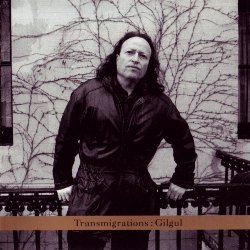Wolf Krakowski - Transmigrations Gilgul (2001)
Wolf Krakowski - Transmigrations: Gilgul (2001)

1. Tsen brider 2. Varshe 3. Regndl 4. Friling 5. Shabes, Shabes 6. Alts geyt avek mitn roykh 7. Yeder ruft mikh zhamele 8. Her nor, du sheyn meydele play 9. Yidishe maykholim play 10. Blayb gezunt mir, Kroke 11. Ven du lakhst 12. Zol shoyn kumen di geule Personnel: Wolf Krakowski - vocals, rhythm guitar THE LONESOME BROTHERS: Jim Armenti - guitars, mandolin, bouzouki, saxophone Ray Mason - bass guitar Bob Grant - drums Daniel Lombardo - conga drum, tambourine, maracas, claves, doumbek, shakers, chains Fraidy Katz - backup vocals Jaye Simms, Pamela Smith Salavka - backup vocals
Take a sensitive musician steeped in blues, R&B and rock as well as in Yiddish culture, and traditional Yiddish songs, and what do you get? Not necessarily anything much. But when the musician is the extraordinary Wolf Krakowski, you get an utterly compelling, emotionally highly charged and eclectic, unique blend that is perhaps best described as Yiddishe Blues.
Wolf Krakowski's album Transmigrations - Gilgul, first released in 1996 on Kame'a Media and re-issued on John Zorn's Tzadik label in 2001, is something of a revelation if you haven't heard this outstanding singer before. It is like meeting, quite by chance and completely unexpectedly, a close old friend that you lost contact with more than half a lifetime ago, and discovering that you still relate after all those years.
The title, Transmigrations, derives from the Yiddish and Hebrew term, "Gilgul", a being (human or animal) into which the soul of a dead person may pass to continue life and atone for sins committed in the previous incarnation. Krakowski and his Yiddish songs in the garb of modern blues, R&B, folk-rock, country-rock, and reggae provide, as it were, a vessel for all the stilled voices of the murdered Eastern European Yiddish civilization to "transmigrate" to and be heard once more in a contemporary setting. Given modern trends in popular and world music, and moreover given the pre-existing strong natural affinity between Yiddish and Afro-American musical idioms, it is easy to imagine that had Eastern European Yiddish culture continued to flourish through the 20th century (C.E.), Yiddish popular song might have sounded something like Wolf Krakowski's interpretations at the turn of the 20th century. --- rainloresworldofmusic.net
download (mp3 @VBR kbs):
yandex 4shared mega mediafire uloz.to cloudmailru gett
Last Updated (Sunday, 10 September 2017 08:27)








